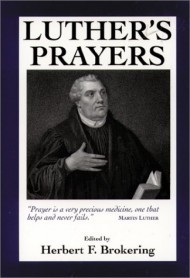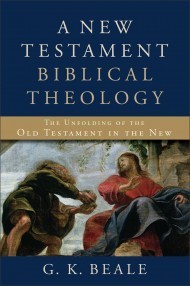Justin Taylor's Blog, page 299
August 15, 2011
All Our Sin for Your Grace, What a Glorious Exchange!
One of my favorite songs from the album Risen is the song "We Have Been Healed":
"We Have Been Healed' From Sovereign Grace Music's album, Risen. Sung by Ryan Baird. Written by Rich Gunderlock and Bob Kauflin. © 2010 Sovereign Grace Worship (ASCAP)/Sovereign Grace Praise (BMI).
August 14, 2011
Luther's Prayers
 David Powlison explains how Martin Luther used the Bible in prayer as a textbook, a hymn book, a book of confession, and as a prayer book. (See also R. C. Sproul's forthcoming delightfully illustrated retelling of the true story of Luther and The Barber Who Wanted to Pray.)
David Powlison explains how Martin Luther used the Bible in prayer as a textbook, a hymn book, a book of confession, and as a prayer book. (See also R. C. Sproul's forthcoming delightfully illustrated retelling of the true story of Luther and The Barber Who Wanted to Pray.)
The Least Obeyed Verse in the New Testament?
"As for a person who stirs up division, after warning him once and then twice, have nothing more to do with him."
—Titus 3:10
Slaying the Dragon
"Those who belong to Christ Jesus
have crucified the flesh with its passions and desires."
(Galatians 5:24)

[Photo credit: Smaug.tk]
Picture your flesh—that old ego with the mentality of merit and craving for power and reputation and self-reliance—picture it as a dragon living in some cave of your soul.
Then you hear the gospel, and in it Jesus Christ comes to you and says,
I will make you mine and take possession of the cave and slay the dragon. Will you yield to my possession? It will mean a whole new way of thinking and feeling and acting.
You say:
But that dragon is me. I will die.
He says,
And you will rise to newness of life, for I will take its plan; I will make my mind and my will and my heart your own.
You say,
What must I do?
He answers,
Trust me and do as I say. As long as you trust me, we cannot lose.
Overcome by the beauty and power of Christ you bow and swear eternal loyalty and trust.
And as you rise, he puts a great sword in your hand and says,
Follow me.
He leads you to the mouth of the cave and says,
Go in, slay the dragon.
But you look at him bewildered,
I cannot. Not without you.
He smiles.
Well said. You learn quickly.
Never forget: my commands for you to do something are never commands to do it alone.
Then you enter the cave together.
A horrible battle follows and you feel Christ's hand on yours.
At last the dragon lies limp.
You ask,
Is it dead?
His answer is this:
I have come to give you new life. This you received when you yielded to my possession and swore faith and loyalty to me. And now with my sword and my hand you have felled the dragon of the flesh. It is a mortal wound. It will die. That is certain.
But it has not yet bled to death, and it may yet revive with violent convulsions and do much harm.
So you must treat it as dead and seal the cave as a tomb. The Lord of darkness may cause earthquakes in your soul to shake the stones loose, but you build them up again. And have this confidence: with my sword and my hand on yours this dragon's doom is sure, he is finished, and your new life is secure.
Piper continues:
Christ has taken possession of our soul.
Our old self has been dealt a mortal wound and stripped of its power to have dominion.
The Christian life, the fruit of the Spirit, is a constant reckoning of the flesh as dead (piling stones on its tomb) and a constant relying on the present Spirit of Christ to produce love, joy, and peace within.
August 13, 2011
G.K. Beale's Magnum Opus: A New Testament Biblical Theology
 Greg Beale's magnum opus, A New Testament Biblical Theology: The Unfolding of the Old Testament in the New, will be published by Baker Academic on December 1, 2011. After taking two of Dr. Beale's courses (on on NT Theology and one on the OT in the NT) several years ago, I have been looking forward to this volume.
Greg Beale's magnum opus, A New Testament Biblical Theology: The Unfolding of the Old Testament in the New, will be published by Baker Academic on December 1, 2011. After taking two of Dr. Beale's courses (on on NT Theology and one on the OT in the NT) several years ago, I have been looking forward to this volume.
Here are the endorsements:
"Certainly Beale has written his magnum opus, in which he deftly integrates the Scriptures via the new creation theme. The use of the Old Testament in the New Testament forms the backbone of this work so that readers grasp how the storyline of Scripture coheres. We stand in debt to the author for his detailed and profound unfolding of New Testament theology."
—Thomas R. Schreiner
"It is tempting to confess that dogmaticians merely rummage around in the mines of biblical theologians. With this volume, the quarry has been enlarged and deepened, exposing the richest veins. I found it to be not exactly a page-turner, but rather on almost every page I discovered another spot at which to linger before moving on. Drawing on decades of exegetical research and teaching, A New Testament Biblical Theology exists at the intersection of biblical studies and theology. Carrying on the tradition of Geerhardus Vos, Professor Beale has raised the bar for biblical theology in our day. We will be digesting this volume for many years to come."
—Michael Horton
"This is like a New Testament theology but goes far beyond. It does not merely describe a part of Scripture from the outside; the view is rather interior, developing themes and movements from within the whole Bible's own storyline. Beale does full justice to motifs often neglected. Like no other work I know, A New Testament Biblical Theology gives eschatology (and not just futurology) full due. He writes understandably and frequently engages in exegesis, which reduces generalizations and unsupported assertions. The treatment is theocentric, missional, and doxological. Reflecting thirty years of research and with some six hundred books in its bibliography, this volume is unique in our time and in fact without close parallel in a discipline (biblical theology) that split the Old Testament off from the New over two hundred years ago. Beale has brought them back together in a creative and methodical way. The results will provoke a deeper grasp of God's redemptive aims and further research. For some readers, like this one, a major result will be not only appreciation but also awe at such a masterful treatment of so much of Scripture's wealth."
—Robert W. Yarbrough
"This New Testament biblical theology makes the Old Testament storyline the point of departure for exploring the New Testament message. Beale's volume is far reaching, written at a high scholarly level, and conversant with a wide range of scholarship. Even where one may disagree, Beale's treatment is always informative and at times even provocative. A very important contribution to biblical theology that deserves to be widely read."
—Andreas J. Köstenberger
"A magnificent achievement! Rarely does a volume in biblical studies come along with such breadth, depth, insight, and specificity. It is a brilliant reconstruction of themes that are central to Christian faith. This is a landmark accomplishment."
—David F. Wells
"The canonical scope and focus on the biblical story line give Beale's New Testament Biblical Theology a unique place among the many New Testament theologies now available. The book is vintage Beale, creatively making connections between Old Testament and New Testament and pursuing a definite vision of how the Bible hangs together."
—Douglas J. Moo
"Some New Testament theologies emphasize the distinctiveness of each author or book; others seek a center or unifying theme. Beale's work is decidedly in the second category as he demonstrates 'new creation' as an umbrella category covering all of the other major motifs not only in the New Testament but also in the relevant Old Testament and Second Temple Jewish background material. Along the way, readers are treated to outstanding, up-to-date discussions of most of the main topics they have come to expect and some new ones, especially in light of intracanonical connections. Throughout, Beale is thoroughly evangelical and thoroughly scholarly. This work is a true tour de force."
—Craig L. Blomberg
"This volume, impressive for its massive sweep, is the matured fruit of the author's extensive work over several decades in New Testament theology. A biblical theology concerned with showing the unity and coherence of all biblical revelation in its rich diversity, it explores the various ways the New Testament storyline transforms, as it develops and fulfills, the central elements of the Old Testament storyline with the new creation kingdom seen as the comprehensive outcome of the already-not yet eschatological fulfillment effected by the life, death, and resurrection of Christ. Especially those with interests in biblical eschatology, with some attention to the role of the church and Christian living 'between the times,' as well as in the New Testament use of the Old will profit from the characteristically sound and often stimulating instruction Professor Beale provides."
—Richard B. Gaffin Jr.
"G. K. Beale has been harvesting the fields of biblical theology in major biblical commentaries and exegetical/theological studies for many years. Here now is his biblical theology magnum opus. A New Testament Biblical Theology draws together and generously supplements many strands of Beale's earlier work into a comprehensive and mature expression of the whole. Beale locates the 'organic progress of supernatural revelation' not in a particular central doctrine or idea, but in the Bible's grand storyline, the story of God establishing his new-creational kingdom through Christ and the Spirit. As with all of Beale's works, this volume is brimming with rich and deeply satisfying redemptive-historical exegesis. This provides an enormous feast for anyone wishing to understand in greater detail the thrust of the Bible's saving story, but it also results in a great contribution to scholarship—a broad, well-researched, and well-constructed foundation for future scholarly endeavors in biblical theology."
—Charles E. Hill
"A New Testament Biblical Theology takes Beale's years of study, teaching, and research and presents his readers with the most thorough and mature work of New Testament biblical theology yet seen in the English language. He has structured the massive volume in a beautiful fashion, focusing nearly half of the work on the eschatological storyline of the Old Testament, then moving to the story of the 'already and not yet' latter-day resurrection and new-creational kingdom of the New. His other major themes are sin and restoration, salvation as new creation, the work of the Spirit, and the church and Christian living. The thorough and readable volume demonstrates the contours of the grand sweep of God's great revelation to sinful men and women through the exalted Lord Jesus Christ."
—Richard C. Gamble
"Sola Scriptura" Does Not Mean "Scripture Is the Sole Authority"
Christian Smith—a prolific sociologist widely read by evangelicals—has been wading into theological waters of late. One of his recent books is an extended argument against evangelical "biblicism" (his thesis is that biblicism—even of a more sophisticated kind represented by Packer, Carson, and the like—is intellectually impossible given the reality of "pervasive interpretative pluralism"). For interaction with this book, you could look at Scot McKnight's blog, who thinks the book is a "must-read" addressing "the biggest challenge evangelicalism has to face." Or see Kevin DeYoung's review, who thinks the book is inconsistent and built upon significant caricatures.
A recent convert to Roman Catholicism, Smith has also just published a book on how to go from being a good evangelical to a committed Catholic. (Be on the look out for Chris Castaldo's excellent review in a forthcoming issue of Books & Culture.)
Peter Leithart picked up on Smith's misunderstanding of sola scriptura:
Step #47 [in Smith's 95 steps to move from evangelicalism to Catholicism] is to "realize that the doctrine of sola Scriptura is itself not biblical but, ironically, is received and believed as a sacred (Protestant) church tradition." A neat bit of jiu jitsu, but the next sentence makes one suspect that he's played dirty: sola Scriptura is the belief that Christians have "the Bible alone and no other human tradition as authority." Later, he challenges his readers to find biblical passages that teach that "Scripture or the written word of God is the sole and sufficient authority for Christian faith."
Now, I imagine that there are people who believe sola Scriptura as Smith describes it, and Protestants have always insisted that Scripture is a sufficient revelation of God's will for us (cf., e.g., WCF 1.6). But neither the Reformers nor their heirs concluded that Scripture is the "sole" authority, nor did they deny the relative authority of human teachers. (If Calvin believed the Bible was the "sole" authority, why so much effort and time devoted to reading Augustine and Chrysostom?) As Smith himself points out, the Scriptures themselves point to human teachers and leaders who are to be honored as authorities. Smith is also correct that the New Testament writers encourage Christians to honor apostolic traditions. No argument there, but that's because Smith has missed the point.
The argument is not about "sole" authority but "final" authority.
You can read the whole thing here.
Free Access to the Online ESV Student Study Bible
From the Crossway blog:
The ESV Student Study Bible was simultaneously published in print and online formats. The Online Student Study Bible is hosted through ESVBible.org and functions as a study module, similar to the formats of the ESV Online Study Bible and the Online Literary Study Bible. With notes, book introductions, maps, and specially written articles, it's a portable, easy-to-use tool to compliment your free ESVBible.org account.
Normally on sale for $9.99, you can unlock the Online Student Study Bible for free by sharing it with five friends. Here's how:
Log in to your ESVbible.org account (or register for free)
Click on the add content button at the top
Click on "Student Study Bible Notes"
Click on the "Invite 5 friends" link
Submit 5 e-mail addresses and the Student Study Bible notes and resources will be unlocked – use and enjoy!
August 12, 2011
Responding with Grace and Truth to the Homosexual Lobby
Some might choose to quibble with a thing or two, but the main takeaway here is Bill Hybels's graciousness without undermining truth and conviction in light of this story.
HT: Ed Stetzer, TGC
Our Need-Love for God
C.S. Lewis, The Four Loves (chapter 1):
Man's love for God must always be very largely, and must often be entirely, a Need-love.
This is obvious where we implore forgiveness for our sins or support in our tribulations.
But in the long run it is perhaps even more apparent in our growing—for it ought to be growing—awareness that our whole being by its very nature is one vast need; incomplete, preparatory, empty yet cluttered, crying out for Him who can untie things that are now knotted together and tie up things that are still dangling loose.
David Powlison:
A Concise History of Creeds & Confessions
Justin Holcomb is writing a helpful ongoing series sketching the history of creeds (Apostle's, Nicene, Athanasian) and confessions (like those of Constantinople and Ephesus).
Justin Taylor's Blog
- Justin Taylor's profile
- 44 followers



